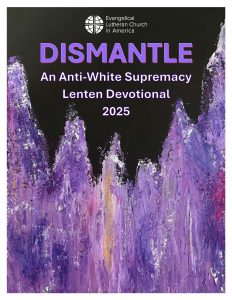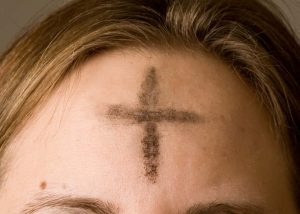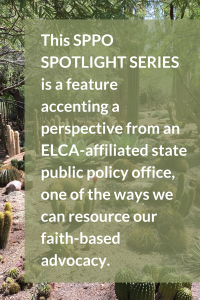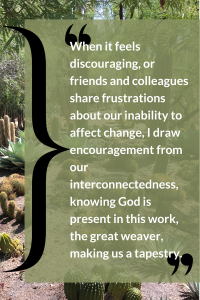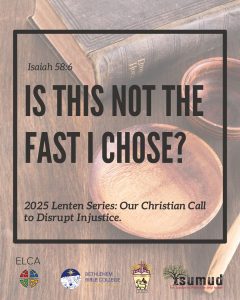ARIZONA | KANSAS | MINNESOTA | NEW MEXICO | PENNSYLVANIA | TEXAS | VIRGINIA
Following are updates shared from submissions from ELCA-affiliated state public policy offices (sppos) this quarter (formerly shared monthly). Full list and map of sppos available.
Lutheran Advocacy Ministry Arizona (LAM-AZ)
Solveig Muus, Director
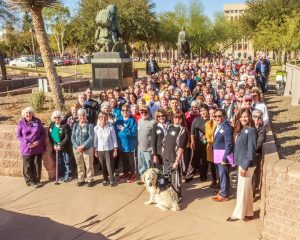
Arizona Lutheran Day at the Legislature photo credit: Eric O. Ledermann ©2025, www.ericoledermann.com
Lutheran Advocacy Ministry Arizona (LAMA) hosted its 4th annual Lutheran Day at the Legislature on Feb. 10. More than 200 Lutherans and friends representing 29 of Arizona’s 30 legislative districts gathered to hear remarks from Senate President Warren Petersen, House Minority Leader Oscar De los Santos, ELCA Grand Canyon Synod Bishop Deborah Hutterer and others. Following the remarks, participants met with their legislators in support of bills requesting appropriations to support free school lunches for qualifying students; automatic restoration of voting rights for first-time offenders upon final discharge from probation or imprisonment; and “Yes in God’s Backyard (YIGBY),” a bill which eases zoning restrictions for houses of worship and allow them to construct low- and middle-income housing on their properties. Participants met with more than 40 lawmakers, enjoyed breakfast, lunch and fellowship together, wrote letters to their congressional leaders and enjoyed a guided tour of the Capitol.
The Grand Canyon Synod Hunger Leaders Network is sponsoring its 3rd annual 40-40-40 Lenten Challenge. The 2025 Lenten Challenge supports our church’s call to respond to nonconventional disasters by raising money for Lutheran Disaster Response (LDR) and the ELCA’s 70-year old Navajo Evangelical Lutheran Mission (NELM) water projects in Rock Point Arizona, The five synods in ELCA Region 2 are challenging one another to raise funds through LDR in support of water projects at NELM, where 40% of the homes in the community have no running water. The challenge: Participate in some spiritual and physical practices during the 40 days of Lent. The synod with the most participants wins!
Kansas Interfaith Action (KIFA)
Rabbi Moti Rieber, Executive Director
Rev. Dr. Mandy Todd, Director of Engagement and Development
2024 Elections Aftermath: Following the 2024 election, Kansas Interfaith Action (KIFA) will increase our focus on community building and mutual support. Our KIFA leadership put together an opinion piece after the election that says among other things: “The most important thing religious leadership can do at a time like this is continue to hold and articulate our core sacred values – love, inclusiveness, diversity, nonviolence, caring for the least of these, caring for the stranger,” and, “A Mainline church in a small town can serve as a base of resilience (not to say resistance) for people who want to be Christian but not Christian Nationalist. However, the congregation has to consciously lean into that role…” The day after the election KIFA held a multi-faith, online vigil. Attendance in our monthly advocates’ meetings and clergy meetings has increased post-election as well. We plan on increasing opportunities for this type of engagement programming both online and in-person.
Legislative Priorities: KIFA set and released our 2025 legislative priorities, including protection of public education, defending the rights of LGBTQ+ Kansans, a comprehensive approach to affordable housing and homelessness, voting rights, and support for childhood immunizations.
Legislative Session: KIFA’s Executive Director Rabbi Moti Rieber and Hunger Advocacy Fellow Sagi Rudnick have been busy during the session, testifying, meeting with legislators, and taking part in lobby days. Bills we have taken a stand on are related to our 2025 legislative priorities including opposition to moves to repeal the affordable housing tax credit.
Calls to Action: In partnership with allied Kansas advocacy organizations, we have made sure our base has been apprised of calls to action, reaching out to legislators on some of the most egregious bills moving through the legislative process. We will also hold our Advocacy Day on March 10.
Lutheran Advocacy – Minnesota (LA-MN)
Tammy Walhof, Director
Jacob Summerville, ELCA Hunger Advocacy Fellow
Main Legislative Issues:
- Electronic Waste Recycling – This effort seeks to update the 2007 definition of e-waste to include any device with a cord, battery, or circuit board. (Previous legislation was passed before the first iPhone). It would also provide free drop-off/collection of e-waste statewide and require manufacturers to cover the cost of that collection based on percent of state electronics sales. This spreads the cost very broadly and is already done for other waste such as packaging.
- Affordable Housing – As part of the Homes for All Coalition, Lutheran Advocacy-MN continues to work for significant funding for housing production/rehabilitation, safe shelters/transitional housing and Emergency Rental Assistance (to keep people/households from losing current housing). LA-MN is continuing the effort to secure Source of Income Protection to prevent discrimination against those using housing vouchers and defend the gains made in previous years.
2025 Lenten (Lutheran) Letter Campaign: Lutheran Advocacy-Minnesota (LA-MN) is again doing the Lenten Letter Challenge and adding the Lutheran Letter Campaign (same issues and materials, but different Lent focus). Materials with talking points and sample letters can be found on the Campaigns/Action Alert page on our website.
Out & About: LA-MN Director Tammy Walhof recently did a presentation on the United Nation’s Conference of Parties COP28 & COP29 climate change conference with Mount Olive Lutheran in Minneapolis. Tammy and Jake hosted a group from Edina Community Lutheran and Redeemer Lutheran (Northern Minneapolis) for an Advocacy Tour of the Capitol, a meeting with Senator Alice Mann, lunch (by Shobi’s Table, a pay-as-you-can cafe), an overview of effective advocacy methods and LA-MN’s 2025 main issues.
Lutheran Advocacy Ministry New Mexico (LAM-NM)
Kurt Rager, Director
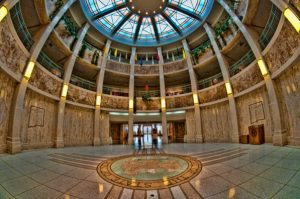
New Mexico state capitol rotunda
1st Session of the 57th Legislature underway.
The New Mexico Legislature’s current 60-day session will continue through March 22nd. Almost 900 pieces of legislation have been introduced. Lutheran Advocacy Ministry – New Mexico (LAM-NM) is tracking over 90 bills, actively speaking in support or opposition to those identified as priority legislation through our 2025 Advocacy Agenda.
LAM-NM Advocacy Agenda highlights:
Affordable Housing & Homelessness – Support legislation that would appropriate $500 million to increase the construction of affordable housing, and fund programs that assist people experiencing homelessness.
Family-Sustaining Income – Support legislation that would increase the state’s minimum wage to $17 per hour and legislation to expand eligibility for public assistance programs.
Healthcare – Support legislation that would expand Medicaid as an option for most New Mexicans.
Hunger – Support appropriations to support basic food needs for college students, emergency food purchases for state food banks and for additional Supplemental Nutrition Assistance Program (SNAP) supplement funds.
Good Governance – Support legislation that would create semi-open primaries, expand reporting requirements for lobbyists, and establish a legislative salaries commission.
Criminal Justice – Support legislation that would update parole board procedures and prohibit private prisons from detaining asylum seekers.
Care of Creation – Support legislation that would add a “Green Amendment” to the state’s constitution, appropriate funds to reclaim uranium mines and require transparency in chemicals used in fracturing fluids.
LAM-NM will hold its annual Legislative Issue Briefing and Bishop’s Luncheon on Feb. 20 with more than 100 anticipated attendees from ELCA congregations and other denominations, traveling from across New Mexico to the state’s capitol of Santa Fe.
Lutheran Advocacy Ministry Pennsylvania (LAM-Pa)
Tracey DePasquale, Director
The Pennsylvania General Assembly began its two-year session in January, and Governor Josh Shapiro outlined the administration’s priorities in an annual budget address that reflected many of the priorities adopted by LAMPa’s policy council for 2025-2027.
While pursuing their goals for the Commonwealth, the administration and legislature, as well as our office, must navigate uncertainty posed by a rapidly changing federal landscape that includes executive orders and legislative proposals hostile to the safety and human dignity of immigrants, members of the LGBTQ+ community and the most economically vulnerable. State and local governments and businesses and nonprofits must contend with threats to already-committed federal funding for projects and services in addition to potential cuts to future funding.
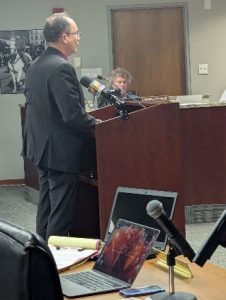
Northeastern Pennsylvania Synod Bishop Christopher deForest urges Allentown to be a welcoming city.
In response, Lutheran Advocacy Ministry Pennsylvania (LAMPa) is working with Pennsylvania synods, ministries and congregations to accompany targeted communities – sharing resources, establishing rapid-response networks and supporting a bold witness for welcome. We are working with coalition partners and government leaders to identify and communicate the ramifications of revenue loss for local communities. Together with Lutheran Disaster Response and ELCA Witness in Society federal staff, we are equipping Lutherans in Pennsylvania to prepare and respond to increased need as well as to advocate for just policies that serve our neighbors.
Join us and register for the livestream/recording of Hope in a Divided World: A Faithful Response to Christian Nationalism, March 7-8, featuring preaching by ELCA Presiding Bishop Elizabeth Eaton and presentations by Amanda Tyler of Christians Against Christian Nationalism, and Dr. Lori Brandt Hale of the International Bonhoeffer Society.
Scott Atnip, Director
The Texas Legislature convened in January for a 140-day biennial legislative session. Texas Impact marked the convening of the session by continuing a 50 year tradition with the Celebration of Public Witness on the steps of the Capitol.
January also included the United Women in Faith Legislative Event with ELCA participants among the 350 United Women in Faith who spent three days in Austin learning about public policy, concluding with meaningful Capitol visits on the final day. Giovana Oaxaca was a star of the second day, giving a timely federal immigration update.
Texas Impact is organizing advocates through issue teams with great ELCA participation in teams related to public schools, climate action, reproductive policy, ending gun violence, immigration and the Rapid Response Team. Each team is meeting virtually every week during the legislative session.
Finally, Texas Impact is excited to announce the addition of Rev. Keats Miles-Wallace to the Texas Impact team as a Policy Consultant. Texas Lutherans are particularly excited to have an ELCA pastor on staff, and Pr. Keats is off to a quick start working with the Immigration Team on LGBTQIA+ issues.
Virginia Interfaith Center for Public Policy (VICPP)
Kim Bobo, Co-Executive Director
Rev. Dr. LaKeisha Cook, Co-Executive Director
The Virginia Interfaith Center for Public Policy (VICPP) is focused on bringing a faith voice to the “short session” (6 weeks) of the Virginia General Assembly. The organization had more than 450 advocates registered for its Day for All People advocacy day in January and brought another 70 students to the General Assembly two weeks later. More than 100 meetings were organized with Delegates and Senators discussing priority issues.
Although the final outcome of bills will not be known until the governor reviews them and legislators return in April to review the governor’s amendments (or vetoes), it appears that the following bills that VICPP has led on will be sent to the governor:
- Presumptive eligibility for pregnant women (allowing likely eligible folks to get on Medicaid sooner)
- End to youth shackling (in courts).
- Expanded process for education in prisons.
- Keeping rural maternity wards open.
VICPP is still working on sending bills on paid sick days and faith in housing to the Governor.
After the General Assembly, VICPP will switch its attention to the federal attacks on immigrants and refugees in Virginia.
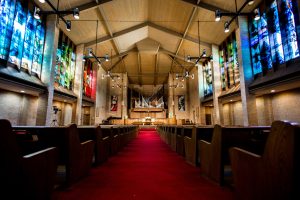 Another way to think about this passage is a protest. By naming the difference between Jerusalem’s ideals and Jerusalem’s actions, Jesus protests the difference between the two. Since our primary practice in Lent is to confess sin, it’s not common to consider protest as a practice of the season. Yet, consider that the goal of protest and the goal of confession are both to seek reconciliation. They seek to restore the ideals of life for all people. Confession primarily calls for personal accountability and behavior change, while protest primarily calls for social accountability and behavior change.
Another way to think about this passage is a protest. By naming the difference between Jerusalem’s ideals and Jerusalem’s actions, Jesus protests the difference between the two. Since our primary practice in Lent is to confess sin, it’s not common to consider protest as a practice of the season. Yet, consider that the goal of protest and the goal of confession are both to seek reconciliation. They seek to restore the ideals of life for all people. Confession primarily calls for personal accountability and behavior change, while protest primarily calls for social accountability and behavior change.

